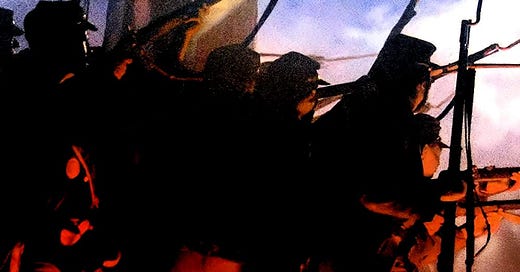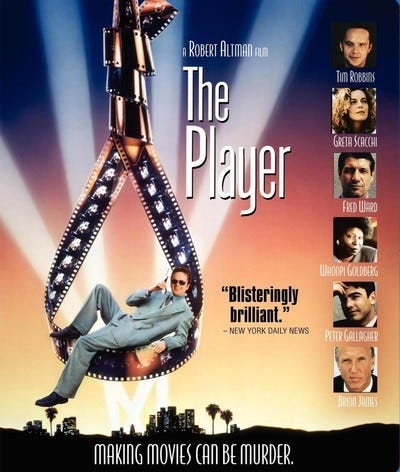One night when I was 10 years old, I secretly stayed up past my bedtime to watch the Academy Awards on TV. My fervent hope was that Denzel Washington would win Best Supporting Actor for a Civil War epic I loved called Glory.
As Geena Davis called his name as the winner, a jolt of excitement shot through my body, and I punched the air — yes! (More on this in a bit.)
At that age, movies were magical for me, and the movie theater was a holy place. So by extension, the Academy Awards presentation was one of the most anticipated nights on the TV calendar.
As a kid, I was obsessed with movies and with keeping track of statistics and facts. Those interests converged perfectly when it came to the Academy Awards. I kept a running list of every Oscar winner in all the major categories, dating back to 1929. My goal was to see all of them.
I got pretty far toward achieving that goal, but once I went off to college, my dedication to the project waned. And over time, my zeal for the Oscars waned as well. Judging by the show’s recent TV ratings, I wasn’t alone.
But every few years, there’s a film that rekindles the feeling I had about Glory, when I was 10.
I’m talking about Parasite and 12 Years a Slave and Boyhood and The Hurt Locker and The Social Network and Inglorious Basterds and Michael Clayton and Little Miss Sunshine and… okay, I’ll stop.
My experiences with those movies have one thing in common: I saw all of them in a theater.
I know, going to the movies today feels less vital than ever. This makes me sad, but I’m complicit as well. Of this year’s 10 nominees for Best Picture, I saw seven in my living room and only two on a big screen.
One of the two I went to see was The Fabelmans, and I’m thankful I did. Sitting in a theater with the story unfolding on a big screen, I got that magic feeling again. The experience was deeply moving.
Yes, it’s a semi-autobiographical film about Steven Spielberg’s youth, but I saw a lot of myself in it as well.
Would my feelings have been so profound had I watched The Fabelmans in my living room, with an almost limitless selection of distractions around me? Perhaps not.
So for the rest of 2023, I’m vowing to see more of the year’s best movies on a big screen.
As for Oscar night this Sunday, well, it looks like it’s going to be a bonanza for Everything Everywhere All at Once. But I’ll be watching and rooting for The Fabelmans.
I’m a lot older these days, and my bedtime’s a lot later. But every now and then, I can still tap into my 10-year-old self, and conjure something almost primal — a love of movie magic, living deep in my soul.
On to this week’s Hollywood-themed list…
The Best…
…Nostalgic Movie I Watched This Week
Glory (1989) — Directed by Ed Zwick
Streaming on Hulu; available for rent on various other streaming services
I had expected to write about movies nominated for down ballot Oscars this week, but nothing I’ve seen recently compelled me to the keyboard.
Instead, I gave a nod to my 10-year-old self and watched Ed Zwick’s Glory for the first time in years.
The film is based on the true story of the Massachusetts 54th, one of the first Black regiments to serve in the Civil War. It’s largely told through the eyes (and letters) of Col. Robert Gould Shaw (played by Matthew Broderick), the young Bostonian who commanded the outfit.
But the heart of the film is found in a handful of nuanced Black characters, particularly soldiers played by Morgan Freeman, Andre Braugher, and Denzel Washington. Really any of that trio could have been nominated for Best Supporting Actor, and it’s heart-warming to see Morgan Freeman applauding like a proud papa when Denzel’s name was announced on Oscar night.
The film’s painstaking re-creation of the Civil War era feels alive and modern in a way that was compelling in 1989 and remains so today, particularly the brutal battle scenes (Glory also won Oscars for cinematography and sound).
But so much more than that stays with you: the images of Black men fighting against that most shameful of institutions; the sacrifices they and future generations would make for freedom; and an aspiration that we still carry today — to form a more perfect union.
Glory is not a perfect movie. It’s earnest and self-serious. The filmmakers took a few liberties with the historical record. And I’d like to think the story today might be told more through Black eyes than through Col. Shaw’s.
But I’m glad it exists at all. I bet Denzel is, too.
…Hollywood-related Book I Read This Week
Hollywood: The Oral History (Harper/HarperCollins Publishers, 2022) — By Jeanine Basinger and Sam Wasson
I wrote last week about an unfathomably ambitious podcast project that, at the producer-host’s current output rate, will take 20 years to complete.
This week I present a more fathomable but still incredibly ambitious book, Hollywood: The Oral History.
Let me first dispense with the statistics. This book is 739 pages long. It features comments from more than 300 people who have worked in Hollywood, spanning the silent era to the present.
Authors Jeanine Basinger and Sam Wasson culled these comments from transcripts of nearly 10,000 hours of conversations with 3,000 different speakers at the American Film Institute’s Harold Lloyd Master Seminars, which have been held since 1969.
The result is a chronological history of Hollywood told by the people who made the movies: producers, directors, actors, writers, cinematographers, costume designers, makeup artists, stunt performers, composers, and more.
The concept of the book intrigued me more than anything — it’s an incredibly rich research project for the authors to have undertaken. Figuring out how to shape those 10,000 hours into a well-organized and coherent structure must have been challenging and fun.
Anyway, you’ll enjoy the book if you’re the kind of person who, for example:
Enjoys a good Margaret Dumont story
Thinks Edith Head might have been a fraud
Knows the qualitative differences between pictures made by MGM, Warner Bros., and Columbia in the 1940s
I enjoy a good Margaret Dumont story (pp. 460-461), so I got a kick out of it.
The book has the typical shortcomings of most oral histories. There’s little contextualizing, no critical voice, no imposition of cultural or sociological perspectives from an all-knowing narrator.
But what ties together the whole thing is the knowledge that every voice in the book contributed to the making of Hollywood magic. And even working within the confines of the machine, a great many of them remained in awe of it, just like the rest of us.
…Movie About Hollywood I Revisited This Week
The Player (1992) — Directed by Robert Altman
Streaming on HBO Max; available for rent on various other streaming services
When I was a teenager, my favorite film about Hollywood was Robert Altman’s The Player, a satirical look at the movie business starring Tim Robbins as a feckless studio executive named Griffin Mill.
As Mill explains, his job is to listen to pitches all day and then decide which precious few stories his studio should turn into movies.
He’s extremely well compensated for this rather absurd job, but as the movie starts to unfold, he’s got two big problems: rumors are all over the trades that he’s about to be fired; and threatening notes from an anonymous, jilted writer start appearing at his office.
From there, we get a tale of murder, office politics, and Hollywood endings, with Hollywood itself as a supporting character.
Watching it again this week, I could see what the appeal was to 16-year-old me. Altman makes almost constant visual and verbal references to classic Hollywood noirs, including a self-referential nod to the famous opening shot of Orson Welles’s Touch of Evil.
Plus, dozens of Hollywood stars and personalities essentially serve as extras and background actors.
Put another way, the movie can be viewed as one long in-joke, and I loved having enough of a movie vocabulary at the time to feel like it was made for me.
The story also felt sharp, funny, and true — even though I didn’t really know anything about the movie business. I was just a kid in Connecticut, watching VHS tapes in my room.
So how does The Player hold up today, 31 years after its release?
Well, the satire still works, though it feels a little dated. The period Altman longs for — the ’70s, when art films could be culturally and commercially successful — now feels like ancient history.
But the movie is still darkly funny and suspenseful, with great cameos, and all those movie references. So yes, while much has changed in Hollywood since 1992, The Player remains one of the best and most insightful films ever made about the movie business.
Here are links to some of my past essays, in case you missed any shows, movies or books:
TV Series:
Shrinking (2023)
Enlightened (2011-13)
Fleishman is in Trouble (2022)
Slow Horses (2022)
Movies/Documentaries/Comedy Specials:
Brick (2005)
Inherit the Wind (1960)
Marc Maron: From Bleak to Dark (2023)
The Elephant Whisperers (2022)
Fire of Love (2022)
Tár (2022)
Metallica: Some Kind of Monster (2004)
The Queen of Basketball (2021)
Bardo, False Chronicle of a Handful of Truths (2022)
Books:
Code Name Blue Wren by Jim Popkin
Killers of the Flower Moon by David Grann
Good for a Girl by Lauren Fleshman
It’s OK That You’re Not OK by Megan Devine
An Immense World by Ed Yong
The Boys by Ron Howard and Clint Howard
Folk Music: A Bob Dylan Biography in Seven Songs by Greil Marcus





Lovely and evocative piece by Daniel on Oscar-worthy films, and what sticks in our minds over the years. (In mine, especially: Cher, Aiello, Cage, Gardenia, Dukakis, in Moonstruck). The Oscar broadcasts are most often cringe worthy, and I complain about having to watch them. I sometimes wonder how the actors have time to make films, considering all the award events they have to show up for, and why people who are actual heroes don't get such attention. But then I remember the magic...